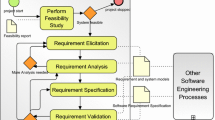Abstract
The importance of requirements engineering (RE) has been raised numerous times in literatures. To choose suitable RE techniques for a particular project in a given situation is a challenging task, requiring substantial expertise and efforts. To help solving this problem, an expert system based approach is proposed. This expert system uses the knowledge from domain experts to model the causal factors of RE techniques. It can select suitable RE techniques for a software project. A web-based questionnaire is created in the first place to collect the expertise available in the community. The information collected by the questionnaire is analyzed and transformed into a new dataset for constructing a Bayesian Belief Network (BBN). The resulting BBN integrated with a GUI forms an expert system for RE techniques modeling and selection. Empirical study validates the transformed dataset and shows that the expert system outperforms other predictors in selecting suitable RE techniques in different RE phases.
Preview
Unable to display preview. Download preview PDF.
Similar content being viewed by others
References
Agile Development in Product Line Engineering Website: http://www.utdallas.edu/~kxf041000/research/aple.html
Manifesto for Agile Software Development, http://www.agilemanifesto.org
Agile Product Line Engineering Questionnaire, http://129.110.92.41/Default.aspx
Bayesian Networks in Java, http://www.cs.cmu.edu/~javabayes
Cheng, J., Greiner, R., Kelly, J., Bell, D.A., Liu, W.: Learning Bayesian networks from data: An information-theory based approach. Artificial Intelligence 137, 43–90 (2002)
Chickering, D.M.: Optimal structure identification with greedy search. Journal of Machine Learning Research, 507–554 (2002)
Feng, K., Lempert, M., Tang, Y., Tian, K., Cooper, K., Franch, X.: Developing a Survey to Collect Expertise in Agile Product Line Requirements Engineering. In: Inaugural International Research-in-Progress Workshop on Agile Software Engineering, Washington DC (2007)
Friedman, N., Geiger, D., Goldszmidt, M.: Bayesian network classifiers. Machine Learning 29, 131–163 (1997)
Heckerman, D.E., Geiger, D., Chickering, D.M.: Learning Bayesian networks: The combination of knowledge and statistical data. Machine Learning, 197–243 (1995)
Macaulay, L.A.: Requirements Engineering. In: Applied Computing. Springer, Heidelberg (1996)
Moore, A., Wong, W.: Optimal reinsertion: A new search operator for accelerated and more accurate Bayesian network structure learning. In: Twentieth International Conference on Machine Learning (2003)
Nuseibeh, B., Easterbrook, S.: Requirements engineering: a roadmap. In: Finkelstein, A. (ed.) The Future of Software Engineering. ACM Press, New York (2000)
Pohl, K., Böckle, G., van der Linden, F.J.: Software Product Line Engineering: Foundations. Principles and Techniques. Springer, Heidelberg (2005)
Quinlan, R.: C4.5: Programs for Machine Learning. Morgan Kaufmann, San Francisco (1992)
Singh, M., Valtorta, M.: An algorithm for the construction of Bayesian network structures from data. In: 9th Conference on Uncertainty in Artificial Intelligence, pp. 259–265 (1993)
Spirtes, P., Meek, C.: Learning Bayesian networks with discrete variables from data. In: Proceedings from First Annual Conference on Knowledge Discovery and Data Mining, pp. 294–299 (1995)
Tang, Y., Cooper, K., Cangussu, C.: A Survey and Analysis of Bayesian Belief Network Structure Learning Algorithms: Accuracy and Sensitivity to Noise, Technical Report. Department of Computer Science. University of Texas at Dallas (2009)
Tsamardinos, I., Brown, L.E., Aliferis, C.F.: The max-min hill-climbing Bayesian network structure learning algorithm. Machine Learning (2006)
Xie, X., Geng, Z.: A Recursive Method for Structural Learning of Directed Acyclic Graphs. Journal of Machine Learning Research 9, 459–483 (2008)
Yadav, S.B., Bravoco, R.R., Chatfield, A.T., RA-Jukumar, T.M.: Comparison of analysis techniques for information requirement determination. ACM 31(9), 1090–1097 (1988)
Author information
Authors and Affiliations
Editor information
Editors and Affiliations
Rights and permissions
Copyright information
© 2009 Springer-Verlag Berlin Heidelberg
About this paper
Cite this paper
Tang, Y., Feng, K. (2009). An Expert System Based Approach to Modeling and Selecting Requirement Engineering Techniques. In: Liu, W., Luo, X., Wang, F.L., Lei, J. (eds) Web Information Systems and Mining. WISM 2009. Lecture Notes in Computer Science, vol 5854. Springer, Berlin, Heidelberg. https://doi.org/10.1007/978-3-642-05250-7_3
Download citation
DOI: https://doi.org/10.1007/978-3-642-05250-7_3
Publisher Name: Springer, Berlin, Heidelberg
Print ISBN: 978-3-642-05249-1
Online ISBN: 978-3-642-05250-7
eBook Packages: Computer ScienceComputer Science (R0)




